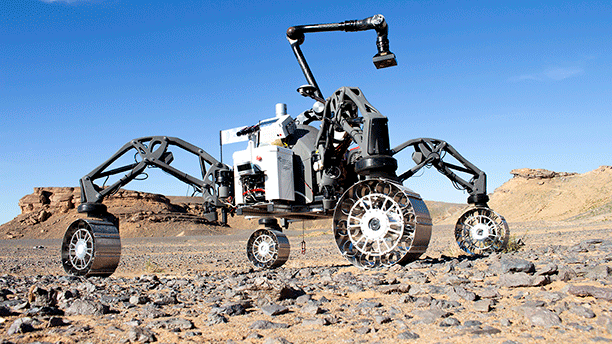Success of the Morocco´s Space Robotics Trials

From mid-September to 15 December, GMV has been taken part in the final field tests of the projects included under the European Commission’s (H2020) Strategic Research Cluster (SRC) program.
The main aim of the space robotics SRC is to create, within the timeframe of 2020-2030, the necessary tools for consolidating the technical maturity of robotics systems for in-orbit-servicing and planetary-exploration missions. The PERASPERA project which is providing the roadmap and technical supervision of the program, funded under the Research and Innovation Programme, Horizon 2020 (H2020), is being coordinated by the European Space Agency (ESA); the partners are the Italian Space Agency (Agenzia Spaziale Italiana: ASI), Spain’s Industrial Technology Development Center (Centro para el Desarrollo Tecnológico Industrial: CDTI), the French Space Studies Center (Centre National d’Etudes Spatiales: CNES), the German Aerospace Center (Deutsches Zentrum für Luft- und Raumfahrt: DLR) and the UK Space Agency (UKSA)
GMV is leading 3 of these technology building blocks: the European Space Robotics Control and Operating System-OG1 (ESROCOS), centering on the creation of operational software capable of controlling a space robotics system in all mission phases; the European Robotics Goal-Oriented Autonomous Controller-OG2 (ERGO), the block designed to develop the autonomy system for planning, scheduling and overseeing the execution of activities of robotics systems; and Facilities for Testing Orbital and Surface Robotics Building Blocks-OG6 (FACILITATORS), for providing the orbital and planetary scenarios for the rest of the projects, including the preparation of facilities for validation of robotics systems and the organization of field testing campaigns.
In this ambitious test campaign conducted at Ibn Batuta (Sahara desert), the ERGO software was successfully validated and GMV successfully achieved a fully aoutonomous long traverse.
ERGO successfully proved its ability to drive the DFKI SherpaTT rover to perform, in a representative Martian environment, a fully autonomous (goal oriented) long traverse. The SherpaTT rover traveled 1.4 kilometers in eight hours planning, re-planning its nominal route following unexpected/unplanned events. Starting with an original goal of taking a soil sample at a remote destination, the rover travelled a 1.4 kilometer-long route in the Moroccan desert landscape of wide plains, but also steep slopes and gorges. In doing so, it planned its own route and reacted to unforeseen situations, e.g. adapting to changing ground conditions and overcoming obstacles.
Along this route SherpaTT carried a camera and image-recognition system capable of ascertaining if the surrounding rock or soil has interesting features not previously catalogued, for subsequent characterization and analysis. On this principle of opportunistic science SHERPA.TT acted completely autonomously, altering its initial plan defined by human operators to suit this new information input. This new plan included taking images of the unknown features catalogued as of potential interest (rocks, terrain, etc…). This whole process has now proven the ERGO system’s autonomous decision-making capabilities.
The technology developed in ERGO is designed to meet the needs of future space exploration vehicles and spacecraft both for orbital or planetary scenarios. Within ERGO GMV (Spain and United Kingdom) together with several European partners (Airbus DS Ltd, DFKI, Ellidiss Technologies, King College London, SciSys, University of Grenoble Alps, and University of Basel) has designed, developed and now validated a goal oriented autonomy system suitable for application to different space robots operating in harsh environments, both space and terrestrial (i.e. nuclear, oil-and-gas).
This project has received funding from the European Union's Horizon 2020 research and innovation programme under grant agreement No 730086